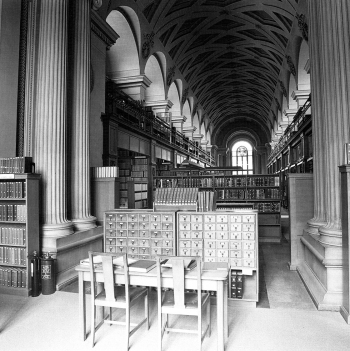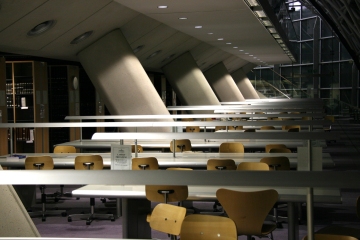 Law has been studied and taught in Cambridge since the thirteenth century, when the core subjects of legal study in all European universities were Civil law (the law of ancient Rome) and the Canon law of the Church. Early graduates of the Cambridge Faculty of Canon Law held the highest judicial positions in Europe - in the Rota at Avignon - and two of them (William Bateman and Thomas Fastolf) wrote the first known law reports in the ius commune tradition. The principal commentator on medieval English Canon law, William Lyndwood, was another graduate of the Faculty. The Faculty of Canon Law was closed by King Henry VIII in 1535, but the Faculty received some compensation when the same king appointed the first Regius Professor of Civil Law in about 1540. Academical legal learning was cosmopolitan; Cambridge doctors of law practised in the ecclesiastical and admiralty courts, assisted the nation in foreign embassies, and discoursed on law, justice and government in philosophical and comparative terms. Here lay the roots of the Faculty's long standing tradition of excellence in international and comparative law, jurisprudence and legal history.
Law has been studied and taught in Cambridge since the thirteenth century, when the core subjects of legal study in all European universities were Civil law (the law of ancient Rome) and the Canon law of the Church. Early graduates of the Cambridge Faculty of Canon Law held the highest judicial positions in Europe - in the Rota at Avignon - and two of them (William Bateman and Thomas Fastolf) wrote the first known law reports in the ius commune tradition. The principal commentator on medieval English Canon law, William Lyndwood, was another graduate of the Faculty. The Faculty of Canon Law was closed by King Henry VIII in 1535, but the Faculty received some compensation when the same king appointed the first Regius Professor of Civil Law in about 1540. Academical legal learning was cosmopolitan; Cambridge doctors of law practised in the ecclesiastical and admiralty courts, assisted the nation in foreign embassies, and discoursed on law, justice and government in philosophical and comparative terms. Here lay the roots of the Faculty's long standing tradition of excellence in international and comparative law, jurisprudence and legal history.
English law was added to the curriculum in 1800, with the foundation of the Downing Professorship of the Laws of England. Examinations in law for the B.A. Degree began in 1858, and the Faculty has grown steadily since then in size and in the range of its interests. The other established chairs in the Faculty are: the Whewell (International Law, 1867), the Rouse Ball (English Law, 1927), the Wolfson (Criminology, 1959), the Arthur Goodhart Visiting Professorship (1971), the Professorship of Law (1973) the S.J. Berwin (Corporate Law, 1991), the Herchel Smith Professorship of Intellectual Property Law (1993), and the Professorship of European Law (1994).
Among benefactions received by the Faculty to support study and research have been the Whewell Trust Fund (1867), for scholarships in international law; Edmund Yorke's bequest (1873), used for the Yorke Prize and other undertakings connected with the study of law; the Maitland Memorial Fund (1906), established in honour of F. W. Maitland, Downing Professor and renowned legal historian, for the promotion of research and instruction in the history of law and of legal language and institutions; the Squire Scholarship Fund, received from the trustees of Miss Rebecca Flower Squire in 1901 to provide scholarships and grants in law; the Wright Rogers bequest (1966), for scholarships and grants; the Hersch Lauterpacht Fund (1967), for the study of international law; and a number of prize funds. Further generous support was provided in connection with the new building.
There are at present over 70 University and College Teaching Officers in Law. They include specialists in almost every aspect of English law and its history, the laws of other countries (especially European), European Community law, public and private international law, Roman law, legal philosophy, and criminology. A list of teaching members, with their principal research interests, is available in the Academic staff section.
At any one time around 6% of Cambridge undergraduates are reading law. The student body comprises about 700 undergraduate and 250 graduate students. Graduates from the Faculty are prominent in academic life, in the judiciary, and in both branches of the legal profession. Cambridge judicial alumni include Judges of the International Court of Justice, the European Court of Justice, Court of Appeal and Supreme Court of the United Kingdom.
Sidgwick site
 The new Law Faculty building in West Road, designed by Lord Foster and Partners, and opened in 1995, brought together on one site the Squire Law Library, the Faculty's lecture and seminar rooms, the administrative offices, and common-room facilities. It doubled the shelf capacity of the library, increased the space for readers and provides a focus for Faculty activities, such as formal meetings, informal gatherings, and moots.
The new Law Faculty building in West Road, designed by Lord Foster and Partners, and opened in 1995, brought together on one site the Squire Law Library, the Faculty's lecture and seminar rooms, the administrative offices, and common-room facilities. It doubled the shelf capacity of the library, increased the space for readers and provides a focus for Faculty activities, such as formal meetings, informal gatherings, and moots.
A further new building for the Institute of Criminology was completed adjacent to the Faculty of Law in the summer of 2005.
On 15 October 2016, the Faculty building was officially named the David Williams Building, in honour of the late Professor Sir David Williams. A plaque was unveiled by Lady Williams at a naming ceremony. The Vice-Chancellor, Sir Leszek Borysiewicz, presided at the ceremony, which was attended by members of the Williams family, staff and students of the Faculty, and guests including Sir David and Lady Li and representatives of leading law firms.

 Facebook
Facebook  X/Twitter
X/Twitter  Instagram
Instagram  YouTube
YouTube  Flickr
Flickr  LinkedIn
LinkedIn